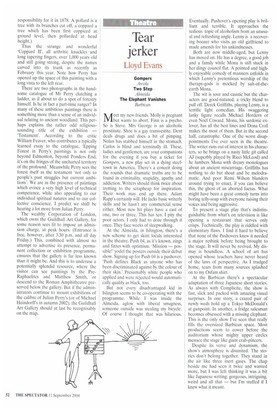Tear jerker
Lloyd Evans
Gompers Arcola Two Step
1/meido
The Elephant Vanishes
Barbican
Meet my new friends. Molly is pregnant but wants to abort. Finn is a psycho. So is Steve. Mrs George is an alcoholic prostitute. Shoe is a gay transvestite. Dent deals drugs and does a bit of pimping. Nolan has stabbed himself in the stomach. Carlos is blind and terminally ill. These, ladies and gentlemen, are your companions for the evening if you buy a ticket for Gompers, a new play set in a dying steeltown in America. There's a conceit doing the rounds that dramatic truths are to be found in criminality, stupidity, apathy and addiction. Writers should think twice about trotting to the scrapheap for inspiration. Their work may end up there. Adam Rapp's certainly will. He lacks basic writerly skills and he hasn't any commercial sense either. Most new hit plays have a cast of one, two or three. This has ten. I pity the poor actors. I only had to doze through it once. They face weeks of sleepwalking.
At the Almeida, in Islington, there's a new scheme to get skint locals interested in the theatre. Push 04, as it's known, zings and fizzes with optimism. 'Mission — possible!' yodel the posters outside their debut show. Signing up for Push 04 is a pushover. 'Push defines Black as anyone who has been discriminated against by the colour of their skin.' Presumably white people who applied and were rejected would automatically qualify as black, too.
But not every disadvantaged kid in Islington seems to be co-operating with the programme. While I was inside the Almeida, aglow with liberal smugness, someone outside was stealing my bicycle. Of course I thought that was hilarious.
Eventually. Pushover's opening play is brilliant and terrible. It approaches the tedious topic of alcoholism from an unusual and refreshing angle. Lenny is a recovering boozer who visits an old girlfriend to made amends for his unkindnesses.
Both are now middle-aged, but Lenny has moved on. He has a degree, a good job and a family while Mona is still stuck in her dingy council flat. A pointed and highly enjoyable comedy of manners unfolds in which Lenny's pretentious worship of the therapy-gods is mocked by salt-of-theearth Mona.
The wit is sour and caustic but the characters are good-natured, a tricky blend to pull off. Derek Griffiths, playing Lenny, is a terrific light comedian. His swaggering lanky figure recalls Michael Hordern or even Noel Coward. Mona, his sardonic exlover, has all the best lines and Dona Croll makes the most of them. But in the second half, catastrophe. One of the worst disappointments I've ever seen in the theatre. The writer runs out of interest in his characters, so he brings on a nasty little git called AJ (superbly played by Ricci McLeod) and he lumbers Mona with dreary monologues about an ancient miscarriage. Griffiths has nothing to do but shout and be melodramatic. And poor Remi Wilson blunders around trying to enact, if you can believe this, the ghost of an aborted foetus. What might have been a great comedy turns into boring telly-soap with everyone raising their voices and being aggressive.
To present a stage play that's indistinguishable from what's on television is like opening a restaurant that serves only crisps. Technically, the play is riddled with elementary flaws. I find it hard to believe that none of the Pushovers knew it needed a major rethink before being brought to the stage. It will never be revived. My dismay is boundless. A school of art has opened whose teachers have never heard of the laws of perspective. As I trudged home, tears from many sources splashed on to my Oxfam shirt.
At the Barbican there's a spectacular adaptation of three Japanese short stories. As always with Complicite, the show is fast, slick and packed with amazing visual surprises. In one story, a crazed pair of newly weds hold up a Tokyo McDonald's at gunpoint. In another, a fridge salesman becomes obsessed with a missing elephant. This is the only show I've seen that really fills the oversized Barbican space. Most productions seem to cower before the auditorium whose mighty upper circles menace the stage like giant crab-pincers.
Despite its verve and dynamism, the show's atmosphere is disunited. The stories don't belong together. They stand in the air like three inert gases. The chap beside me had seen it twice and wanted more, but I was left thinking it was a bit like Japanese writing: gorgeous, intriguing, weird and all that — but I'm stuffed if I knew what it meant.










































































 Previous page
Previous page